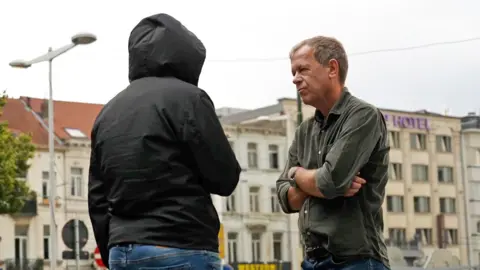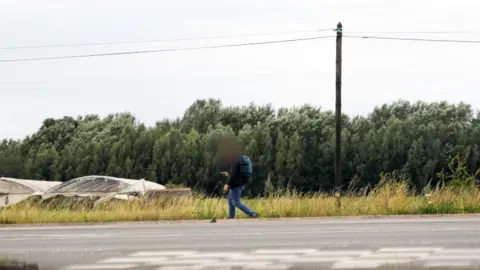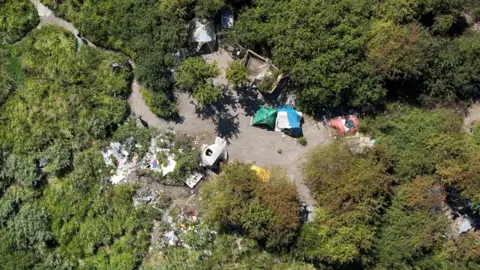BBC News
 BBC
BBCThe findings of a year-long undercover investigation into a violent migrant-smuggling gang were published by BBC News on 5 August – and, as a result, one person has now been arrested in Birmingham.
Here, one of our reporters who assumed a false identity and posed as a migrant, describes how he met one of the gang’s senior members in a secret forest hideout.
I am walking towards the forest near Dunkirk, thinking about the battery in my pocket. I’ve hidden the wires under two T-shirts, but is anything still showing? Is my secret camera working? Is it pointing at the right angle? I have, at most, three hours of battery life left, and I need to get to the smuggler’s secret camp, meet him, and get out safely.
This is perhaps the most dangerous and most important moment for me, the culmination of many months working on this investigation with the team.
There is a small team of high-risk advisors watching my back. With gang members monitoring everyone who enters the forest, I worry my advisors may may end up exposing me rather than protecting me. But they play it perfectly and keep a low profile.
I’m using a false name. My clothes are similar to those worn by other people trying to get a ride on a small boat to England. Scuffed, old shoes. A big, warm, dirty, jacket. A backpack that I’ve spent time trying to make look worn, as if I have travelled long, hard miles to get here.
I keep going over my cover story in my head. The excuses I might need to get away quickly. The possible scenarios. We have planned and planned, but I know nothing ever goes exactly as expected in the field.
I am an Arabic-speaking man and have gone undercover before – but each time is different, and carries different risks.
Over the past couple of years, I’ve spent a long time in northern France, trying to understand and expose the people smugglers’ complicated and shadowy operations. It was not an easy decision to infiltrate a violent criminal network.
I’m entering a world ruled by money, power and silence. But I’m not just curious – I also believe the gangs are not as untouchable as they seem and that I can play a role in exposing them and perhaps helping to stop them.
Inside the forest, my nervousness fades. I am “Abu Ahmed” now – my false identity. I don’t even feel like I’m acting a part.
I’m new in town, a Syrian refugee whose asylum bid was rejected by Germany. I’m scared, desperate, a little lost and at the beginning of an uncertain journey.
I walk down a path to the smugglers’ camp trying to remember the way I came in.

When the smuggler, Abdullah, meets me, he is friendly but he says he needs to leave immediately. I try to sound weary. I must persuade him to wait, to talk to me quickly, while my battery is still working. Then, I can get out of there.
Abdullah suspects nothing and seems entirely at ease. But I know the smugglers have guns and knives and there is only one path that leads in and out of the camp.
A day later, away from the forest, I see online that there has been another fatal shooting there.
One of the most difficult things during my time undercover, in the weeks before I meet Abdullah, is keeping track of the phone numbers. Gang members change them often, and sometimes you can lose months of work in a second. At times I’ve lost hope, seeing everything fall apart. But I keep learning.
I spend a lot of time meeting people waiting for small boats around Calais or Boulogne, asking them which gang they are using, which phone numbers they have. Early mornings are spent at train stations, food distribution centres, or on the edge of forests and beaches. Sometimes I just watch, trying to melt into a crowd, to overhear conversations, to spot glances and gestures and to see who leads and who follows.
I must be careful. I move from place to place in different cars over the weeks, and generally try to disappear into the background. I don’t want to do or say anything that could bring me to the attention of the smugglers. They have so many eyes and ears here, and if they become suspicious, it could be dangerous for me.

Am I scared? Not too often. I have engaged with even more dangerous groups in the past. But I am worried I could make a mistake, forget a detail, and blow my cover. Or at least one of my covers.
I switch phones too, contacting smugglers using different names and back stories to try to piece together who works where and what they do. I label each phone. I have French, German, Turkish and Syrian numbers. It is slow work. I’m careful to make sure I’m in the right place whenever I make a call, in case the smuggler asks me to turn on my video or send a pin showing my location.
The smugglers always ask me, “Where did you get the number?” And, “Who is with you? Where are you staying? How did you get to France?”
Now Abdullah does the same, asking me to send photos showing my journey to the forest from a bus stop in Dunkirk.
Does he suspect me?
In person in the forest, Abdullah appears friendlier than most of the smugglers I have encountered. I notice he seems keen to make all his passengers feel at ease, always responding to calls. He strikes me as ambitious.

Over time, I learn some of the gang’s vocabulary. Migrants are “nafar”. The junior smugglers are “rebari”. The forest is always “the jungle”.
And now it is time for me to leave the jungle and to head back towards my team who are waiting, anxiously, at a nearby supermarket.
As I leave the forest and get to the road, I’m no longer “Abu Ahmed”. I’m a journalist again, tortured by questions.
Did the camera work? Did I manage to film Abdullah confirming his role as a smuggler? Is anyone following me now?
The walk back seems even longer.




